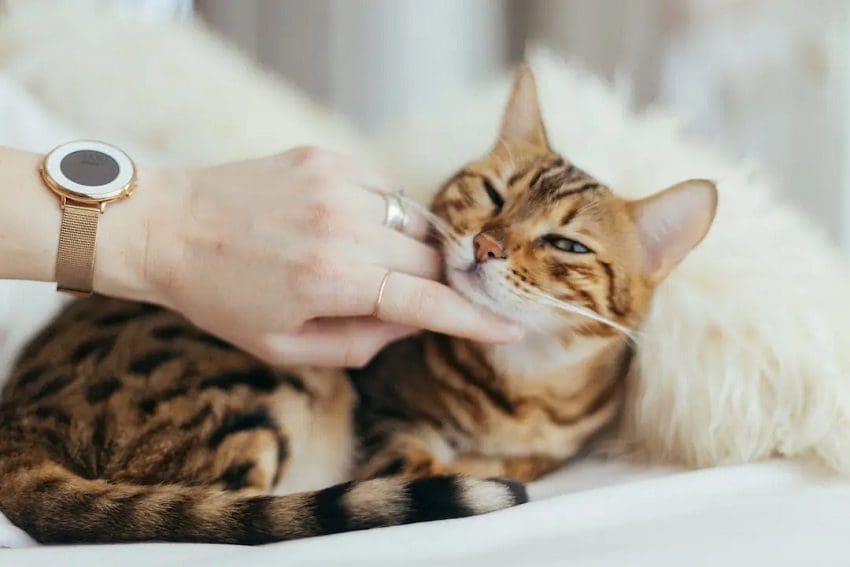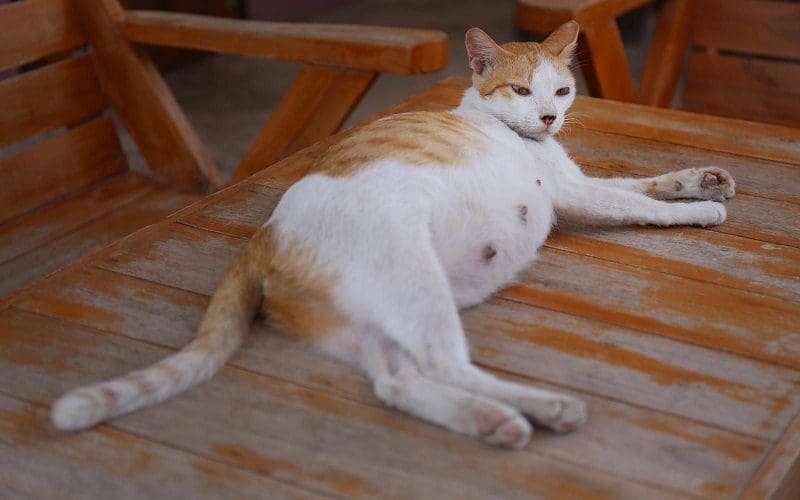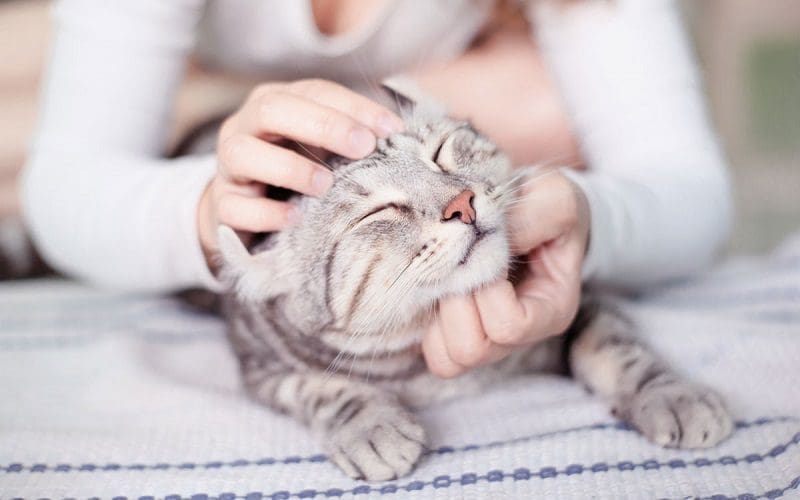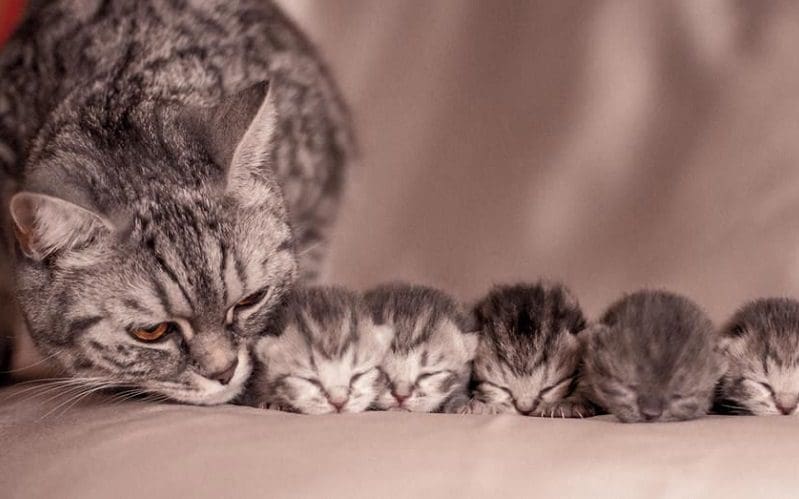Last Updated: 11 months ago
Cats are beloved pets for many people, and one of the most exciting things about owning a cat is watching them mature and birth kittens of their own.
But pet owners might be wondering: How long does a cat stay pregnant?
Knowing the length of a feline pregnancy can help you prepare for the birthing process and the arrival of new kittens.
It’s important to understand cat pregnancy symptoms as well as how to care for your pregnant cat.
This article will provide an overview of what to expect during your cat’s pregnancy, including how long does a cat stay pregnant and what happens after they give birth.
How Long Does a Cat Stay Pregnant?

It’s important to understand the timeline of pregnancy so that you can provide proper care and nutrition for your beloved pet during this time.
The average length of a cat’s pregnancy is 63 days, from conception to delivery.
During this period, there are several signs and symptoms that indicate your cat is expecting kittens.
For example, she may become more affectionate or her nipples may become enlarged and pinker in color as the hormones associated with pregnancy increase.
Additionally, she might start eating more than usual or exhibit nesting behavior, such as finding cozy places around the house to sleep, in preparation for her upcoming litter of kittens.
It’s also important to note that cats have been known to deliver their litters earlier or later than expected due to various factors such as stress levels or health issues.
Therefore, it’s essential that you monitor your pregnant cat closely throughout her entire gestation period so that any potential problems can be addressed quickly by a veterinarian if necessary.
Overall, understanding the length of a cat’s pregnancy is key when it comes to providing adequate care for both cat mothers and kittens during this special time!
By keeping an eye out for signs of labor and being prepared ahead of time with supplies like food bowls and blankets for warmth.
You can ensure your furry family member has everything they need before welcoming their new arrivals into the world!
How to Determine If Your Cat Is Pregnant

While it can be difficult to tell for sure without veterinary help, there are some physical and behavioral signs that can indicate pregnancy in cats.
Step 1: Monitor Your Cat’s Weight Gain
One of the first signs of pregnancy in cats is weight gain.
If your cat has been eating more than usual or appears to have gained a few pounds recently, she could be pregnant.
To get an accurate assessment of her weight gain, weigh her regularly with a kitchen scale or other type of digital scale and compare the results over time.
Step 2: Check For Physical Changes
Pregnant cats often develop enlarged nipples (known as “pinking up”) and their bellies will start to swell as they enter into their third trimester.
You may also notice changes in fur color around the abdomen area due to hormonal shifts during pregnancy.
Additionally, keep an eye out for any discharge from her vulva which could signal labor is near!
Step 3: Look Out For Behavioral Changes
Cats who are expecting usually become more affectionate towards their owners and may even seek out extra attention by purring or rubbing against them frequently.
Pregnant cats also tend to sleep more than usual and might not want to move around much—a sign that she needs plenty of rest before giving birth!
Lastly, watch for any nesting behavior such as gathering blankets or toys into one spot; this could mean she’s getting ready for the delivery day soon!
Step 4: Visit The Vet For A Confirmation Test
If you suspect your cat might be pregnant but aren’t sure yet based on these physical and behavioral signs alone, it’s best to visit the vet for confirmation tests.
Tests like ultrasound imaging or blood test can give you an accurate diagnosis of whether or not she’s expecting kittens.
By following these four steps carefully, you should now have a better idea about whether your cat is pregnant, and when she’ll likely deliver those adorable little bundles of joy!
If you have any further questions about your cat’s pregnancy, don’t hesitate to contact your veterinarian for more information.
Caring for a Pregnant Cat

Cats are amazing creatures, and if you’re lucky enough to have one in your life, you know how much joy they can bring.
But when it comes time for a female cat to give birth, there is an extra level of care that needs to be taken.
Caring for a pregnant cat requires some special attention and preparation so that she has the best possible experience giving birth.
The first step in caring for a pregnant cat is providing her with a private space where she can rest and give birth comfortably.
Line this area with clean towels or blankets so she feels safe and secure during labor. You can also give her a birthing box where she can safely deliver her kittens.
Make sure the litter box, food bowls, and water bowls are nearby as well. Cats need easy access to these items throughout their pregnancy.
Once your kitty goes through the birthing process, monitor her closely over the next few days as she cares for her kittens. She may appear weak or tired due to labor. Make sure she gets plenty of rest during this time!
If at any point you feel like something isn’t right or if your cat appears distressed while caring for her kittens, contact your veterinarian immediately. They will be able to provide guidance on what steps should be taken next.
Caring for a pregnant cat is no small task but it doesn’t have to be overwhelming either.
With proper preparation and monitoring throughout the process, both mother cat and kittens will have everything they need in order to thrive after delivery day arrives.
What to Expect After Your Cat Gives Birth

But it’s important to remember that giving birth is a strenuous process for cats and they need time to recover afterwards.
Here are some things you should expect after your cat gives birth:
1. Fatigue
After giving birth, your cat will likely be tired and want to sleep more than usual
This is normal as their body needs rest in order to heal from the labor process.
Make sure they have plenty of comfortable places around the house where they can curl up and relax undisturbed.
2. Appetite
Your cat may also experience an increased appetite after giving birth due to all of the energy she expended during labor and delivery.
Make sure there is always fresh food available for her so she can get enough nutrients while nursing her kittens or recovering from childbirth.
3. Litter Box Usage
Keep an eye on how often your cat uses her litter box after giving birth.
This could indicate any health issues or complications with urination or defecation post-birth that require medical attention right away if noticed.
4. Bonding With Kittens
You should also observe how much time your cat spends bonding with her kittens following delivery.
This helps ensure the proper development of mother-kitten relationships which are essential for healthy growth in young cats.
By understanding what changes occur in cats immediately following childbirth, you can better prepare yourself for caring for both mama cat and her newborn babies!
If at any point you notice anything out of the ordinary or concerning behavior, contact your veterinarian right away so they can provide appropriate care if needed.
Final Word
In conclusion, it is important to know how long does a cat stay pregnant so that you can be prepared for the arrival of your new kittens.
The length of a cat’s pregnancy varies from breed to breed and can range anywhere from 58-72 days.
To determine if your cat is pregnant, look out for signs such as weight gain, increased appetite, and nesting behavior.
It is also important to provide extra care during this time by providing nutritious food and plenty of rest.
After giving birth, expect your cats’ energy levels to decrease significantly as they will need time to recover from labor and nurse their newborns.
Resources:
